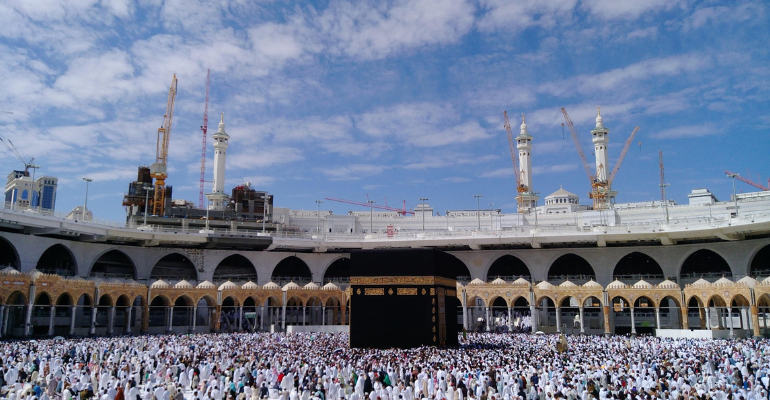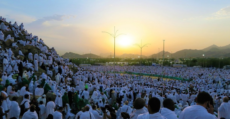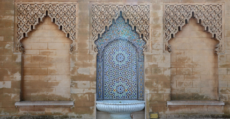In the name of Allāh, ar-Raḥmān (the most merciful), ar-Raḥīm (the bestower of mercy).
We were all saddened and grieved when news of the deaths during Ḥajj was broadcast. A mere days before Hajj, almost 150 people died due to the collapse of a crane in the sacred Masjid al-Ḥarām.
Then, on the joyous day of Eid Al-Adḥā, when Muslims around the world were rejoicing, news of a further 800 deaths in a stampede in Mina was broadcast.
People reacted to this news in various ways. Amongst them were many Muslims who were truly saddened and felt the pain of Muslim families who had lost their loved ones. There were others, however, who used this as an opportunity to score political points or to attack Islām.
Amongst them were those who mocked Islām as a reaction to this tragedy, and amongst them were those who said: ‘Why didn’t Allāh save them?’ ‘Their Pilgrimage was in vain’, and ‘their own god could not save them.’
In replying to such ignorant statements, the following contemplations can be made:
1. The tragedy during ḥajj occurred due to the decree of Allāh.
Allāh, the most high, decrees as he wishes whenever he wishes, and everything that Allāh decrees is due to his divine wisdom. For every instance of success or loss, there is wisdom in the decree of Allāh. Sometimes this wisdom is understood immediately, while at other times it is not fully appreciated. Allāh, the blessed, says
{Allāh decides, and there is no adjusting to his decision} [13:41]
{He is the subjugator over his servants. And he is the wise, the acquainted [with all]} [06:18]
2. Life and death is in the hands of Allāh
From the decree of Allāh, and his complete ability is that he – and only he controls life and death. He gives life and death to whoever he wishes, whenever he decrees. Allāh, the blessed, says:
{He gives life and causes death, and to Him you will be returned} [10:56]
{There is no deity except Him; He gives life and causes death. [He is] your Lord and the Lord of your first forefathers} [44:08]
3. Nobody has been guaranteed eternity, nor safety from death
Regardless of how much a person is beloved to Allāh and how great his worship is, death is still decreed for him. Allāh did not bestow eternity upon any human. He said,
{We did not grant to any man before you eternity [on earth]; so if you die – would they be eternal?} [21:34]
Even those who are the most beloved to him – the Prophets and Messengers – those who reached the epitome of worship, they could not escape death:
{Muḥammad is not but a messenger. [Other] messengers have passed on before him. So if he was to die or be killed, would you turn back on your heels [to unbelief]? And he who turns back on his heels will never harm Allāh at all; but Allāh will reward the grateful [03:144]
In replying to those who mocked Islām, these very sentiments can be applied to ḥajj. Those who died in the tragedy were men and women, like many men and women who have died before them. If they die, will you turn on your backs and mock Islam? Know that whoever turns their backs does not harm Allāh at all. Indeed, Allāh rewards the grateful.
4. We are Muslims, and we live for the Hereafter
Whilst we live this worldly life, our focus is on life after death. We prefer the life which is eternal over a temporary abode. If this is our focus, then our outlook on life – and indeed death – is different to those who disbelieve in the Hereafter.
{Those who disbelieve have claimed that they will never be resurrected. Say, ‘Yes, by my Lord, you will surely be resurrected; then you will surely be informed of what you did. And that, for Allāh, is easy.’} [64:07]
We therefore believe in recompense, so whoever faces a difficulty or an affliction in this life is rewarded for it in the Hereafter, and its pain is alleviated therein. Our Prophet ﷺ told us,
Any believer who is pricked by a thorn will have his rank raised due to it. [1]
For this reason, the outlook of a Muslim is different to the outlook of a non-Muslim.
How amazing is the affair of a Believer – all of his affair is good and this is only for a Believer. If something good comes to him he is grateful and that is good for him. If harm befalls him he is patient and that is good for him. [2]
5. The deeds of the pilgrims will never be lost
Many of the Muslims who died during the ḥajj tragedy did so without actually completing their ḥajj. However, they did not die in vain, and their actions are not lost with Allāh. He said:
{And be patient, for indeed, Allāh does not allow the reward of those who do good to be lost} [11:115]
{They receive good tidings of favour from Allāh and bounty and [of the fact] that Allāh does not allow the reward of believers to be lost} [03:171]
{Indeed, he who has taqwa of Allāh and is patient, then indeed, Allāh does not allow to be lost the reward of those who do good} [12:90]
6. Their death was honourable.
Allāh brought them to an honourable sacred place – Makkah. He chose for them honourable days – the blessed days of ḥajj. He allowed them to be in an honourable state – the state of iḥrām and worship.
When he fulfilled all of this, as a blessing upon them, he decreed that they breathe their last breaths with all this honour.
7. Allāh decreed that they die on Friday or Thursday night.
The Prophet ﷺ gave us glad tidings,
“Whoever dies in the day of Friday, or the night [before] Friday, will be saved from the tribulation of the grave.” [3]
8. They died as people travelling a journey and isolated from their families.
The Prophet ﷺ gave us the glad tidings of how close a traveller is to Allāh, when he turns to him, such that their supplications are not rejected. [4]
9. They will be resurrected according to their death.
They died while performing good deeds: some died in ihrām, others during worship, while others died making dhikr – all in the sacred house of Allāh.
Whoever dies in a state of iḥrām will be resurrected pronouncing the talbiyah. [5]
Every person will be resurrected according to what he was doing. [6]
9. Their death was an honour not a tragedy.
Perhaps this contemplation will not be truly appreciated by a person who disbelieves in Islām. The dream of every Muslim is to die in an honourable way – in worship and in the service of Islām. Every Muslim yearns for death in the sacred city of Makkah; and those people who died during ḥajj were granted this desire.
10. There remains the hurt of a demise
Despite everything which has been stated above, and how Allāh decreed honour for them in their last moments, rather in their martyrdom inshaAllāh. However, this does not mean that we do not grieve over their deaths and feel hurt. Fathers, mothers and children died, and many more fathers, mothers and children were left behind whilst their loved ones died.
We hope that the Saudi authorities will make every effort to investigate the tragedy, learn lessons and then make further efforts to ensure that such accidents are not repeated – inshaAllāh.
11. A final contemplation and reminder for those who remain behind.
The deaths of our brothers and sisters during ḥajj 2015, is a reminder to us all. Consider the decree of Allāh, and the reality of life and indeed death – that it is in the hands of Allāh.
How many amongst the Pilgrims bade farewell to their families for a few weeks, yet never returned to them?
How many among them had bought presents, gifts and toys for their children, yet were not able to present them?
Therefore, the ultimate reality is that our reckoning and returning is to Allāh, and thus we should focus on his pleasure and his worship.
{Fear a day when you will be returned to Allāh. Then every soul will be compensated for what it earned, and they will not be treated unjustly} [02:281]
We ask Allāh to forgive the deceased Muslims and to accept their righteous actions.
O Allāh, forgive and have mercy upon them; excuse and pardon them, and make honourable their deaths
O Allāh, expand their entry into their graves; cleanse them with water, snow, and ice.
O Allāhpurify them of sin as a white robe is purified of filth.
O Allāh, exchange their homes for a better home, their family for a better family, and their partners for a better partner
O Allāh, admit them into your paradise, and protect them from the punishment of the grave and the torment of the Fire.
Written by the one in need of Allāh,
Abul Abbaas Naveed Ayaaz,
Nelson, Lancashire.
Two days after the tragedy, 12th Dhul-Hijjah 1436H
Saturday 26 September 2015.
Footnotes
[1] Narrated by ‘Ā’isha; Collected by Muslim.
[2] Narrated by Ṣuhayb; Collected by Muslim.
[3] Narrated by ‘Abdullah Ibn ‘Amr; Collected by at-Tirmidhee. This narration is not authentic; rather, it is da’īf (weak). However, Shaykh al-Albāni and Shaykh Rashīd Ridā graded it as ḥasan due to its numerous chains of narration, which strengthen each other. In all cases, we hope for the goodness of the Pilgrims who died during ḥajj, regardless of the day.
[4] The Prophet ﷺ said, “Three supplications are answered without any doubt: the supplication of an oppressed person, the supplication of a traveller and the supplication of a father regarding his son.” [Narrated by Abu Hurayrah; Collected by Abu Dawūd & At-Tirmidhī].
[5] Narrated by Ibn ‘Abbās; Collected by Al-Bukhārī & Muslim.
[6] Narrated by Jābir; Collected by Muslim.





